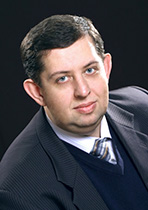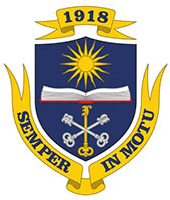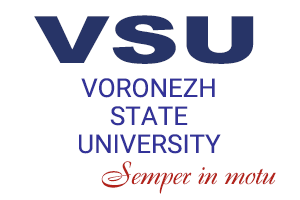Faculty of Physics
Dean

Oleg V. OVCHINNIKOV
Address: Rooms 234, 236, 238 building 1, 1 Universitetskaya Ploschad, Voronezh
Phone: +7 (473) 228-11-60 (1800); +7 (473) 220-83-94, +7 (473) 220-83-96
Fax: +7 (473) 220-87-55
E-mail: ovchinnikov@phys.vsu.ru
Website: www.phys.vsu.ru
Vkontakte page: vk.com/physvsu

Departments
- Department of General Physics
- Department of Theoretical Physics
- Department of Mathematical Physics and Information Technologies
- Department of Solid State Physics and Nanostructures
- Department of Nuclear Physics
- Department of Optics and Spectroscopy
- Department of Semiconductor Physics and Microelectronics
- Department of Radiophysics
- Department of Electronics
- Department of Experimental Physics
- Fundamental Department of Telecommunication System and Electronic Warfare financed by OOO Concern Sozvezdie
The Faculty of Physics of Voronezh State University is the birthplace of landmark discoveries, talented scientists, and highly qualified specialists
- One of the largest and oldest (founded in 1918) faculties at Voronezh State University. It has deeply rooted traditions and well-known scientific schools. The academic staff of the faculty is comprised of highly qualified specialists.
- A world-class centre for modern scientific research. At present, the scientists of the Faculty of Physics are involved in 8 projects of the Russian Science Foundation, the grant of the President of the Russian Federation “The Leading Scientific School of the Russian Federation”, and more than 20 projects of the Russian Foundation for Basic Research as part of various competitions. Young researchers from the Faculty of Physics are holders and executors of more than 20 projects (scholarships and grants of the President of the Russian Federation, grants of the Russian Foundation for Basic Research, grants of the Russian Science Foundation).
- The staff of the faculty annually publish 130 scientific articles in leading scientific journals in physics and physics-related fields. These works include over 15 papers published in journals of the first quartile (Q1) and over 30 papers in the journals of the second quartile (Q2).
- The Faculty of Physics actively develops and promotes tournaments. Among its participants are schoolchildren, undergraduate and postgraduate students, and lecturers. Students from the Faculty of Physics defend the honour of the university at national and international student tournaments of physicists. In 2016, a team of students from the Faculty of Physics represented Russia at an international tournament of physicists in France and was among the three prize-winners.
- A characteristic feature of physics education at the university is its fundamental nature and diversity, which allows graduates from the Faculty of Physics to freely navigate in any area of modern physics. The faculty graduates are good at deep analytical work, solving complex logical problems, developing fundamentally new technologies, research activities, etc.
- The physics education at Voronezh State University goes back to the date of its foundation in 1918. It unites 10 departments in the main areas of modern physics. More than half of these departments were started by Professor Maria A. Levitskaya, one of the first women physicists in Russia, the author of world-class scientific discoveries, and the founder of the largest physics scientific school in Voronezh.
Among the graduates of the Faculty of Physics are the first Soviet Nobel Prize laureate in physics, over 20 laureates of the National Prize and the Lenin Prize laureates, members of academies, prominent scientists, and heads of enterprises in Russia and abroad.
We are proud of our outstanding alumni:
- Pavel A. Cherenkov, a full member of the USSR Academy of Sciences, the first Soviet Nobel Prize laureate in physics, the laureate of the National Prize, the Hero of Socialist Labour, and a graduate of 1928
- Boris L. Tolstykh, the Hero of Socialist Labour, the chairman of the State Committee for Science and Technology of the USSR, the Deputy Chairman of the Council of Ministers of the USSR, and a graduate of 1959
Graduates from the Faculty of Physics work in leading research laboratories and centres in Europe and the United States.
Bachelor's degree
- 03.03.02 Physics
Fields of study:- Physics of Laser and Spectral Technologies
- Nuclear and Medical Physics
- Solid-state Physic
- 03.03.03 Radiophysics
Fields of study:- Radiophysics and Electronics
- Computer Electronics
- Computer Technologies for Information Transfer
- Microelectronics and Semiconductor Devices
- 09.03.04 Electronics and Nanoelectronics
Fields of study:- Integrated Electronics and Nanoelectronics
- Nanotechnologies in Electronics
- 11.03.04 Informatics and Computer Facilities
Field of study: Computing Machines, Complexes, Systems, and Networks - 12.03.03 Photonics and Optical Informatics
Field of study: Photonics and Optical Informatics - 14.03.02 Nuclear Physics and Nuclear Technologies
Field of study: Physics of Atomic Nuclei and Elementary Particles
Master's degree
- 03.04.02 Physics
Programmes:- Optics and Nanophotonics
- Nuclear and Elementary Particle Physics
- Physics of Nanosystems
- 03.04.03 Radiophysics
Programmes:- Telecommunication Systems and Electronic Warfare
- Computer Methods of Radiophysical Information Processing
- Microelectronics and Semiconductor Devices
- 14.04.01 Electronics and Nanoelectronics
Programmes:- Integrated Electronics and Nanoelectronics
- Nanotechnologies in Electronics
- 14.04.02 Nuclear Physics and Nuclear Technologies
Programmes:- Physics of Atomic Nuclei and Elementary Particles
Specialist's degree
- 14.05.02 Nuclear Power Plants: Design, Operation, Engineering
Postgraduate Training Programmes
- 03.06.01 Physics and Astronomy
Fields of study:- 01.04.02 Theoretical Physics
- 01.04.03 Radiophysics
- 01.04.05 Optics
- 01.04.07 Condensed Matter Physics
- 01.04.10 Semiconductor Physics
Secondary vocational education
- 31.02.04 Optical Eyecare
Study options
- Full-time
Duration
- Bachelor’s degree programmes (full-time): 4 years
- Master’s degree programmes (full-time): 2 years
- Specialist’s degree programmes (full-time): 5.5 years
- Postgraduate training programmes (full-time): 4 years
Academic Staff
100 lecturers, almost all of them have academic degrees and titles, including 36 professors with a DSc degree.
Three lecturers are Honoured Scientists of the Russian Federation, five people have the title of Honoured Worker of the Highest Vocational Education of the Russian Federation.
Educational facilities / resources
- 41 laboratories
- 3 display classrooms
- Departmental branches in research institutes and industrial enterprises
- Physics Research Institute
Key areas of research
The faculty has developed the following scientific schools:
- The theory of interaction of laser radiation with matter founded by the Honoured Scientist of the Russian Federation Professor L.P. Rapoport, DSc in Physics and Mathematics. Currently, the school is headed by Professor N.L. Manakov, DSc in Physics and Mathematics.
- Electron structure of condensed matter headed by the Honoured Scientist of the Russian Federation Professor E.P. Domashevskaya, DSc in Physics and Mathematics
- Nuclear and condensed matter physics headed by the Honoured Scientist of the Russian Federation Professor S.G. Kadmensky, DSc in Physics and Mathematics
- Photostimulated processes on crystals with ion and covalent bonds headed by the Honoured Scientist of the Russian Federation Professor A.N. Latyshev, DSc in Physics and Mathematics
- Statistical informatics and radiophysics founded by the Honoured Scientist of the Russian Federation Professor A.P. Trifonov, DSc in Technical Sciences
International partner universities
- Freiburg University, Germany
- University of Tubingen, Germany
- Colorado State University, Fort Collins, USA
- New Jersey Institute of Technology, USA
- University of Delaware, USA
International programmes and projects
- 6 research projects implemented jointly with Leibniz Institute of Photonic Technology (Jena, Germany)
- 1 academic exchange project implemented jointly with Leibniz Institute of Photonic Technology (Jena, Germany)
- Over 30 research projects implemented using megascience facilities
- 23 projects at German Helmholtz Zentrum Berlin BESSY II megafacilities laboratory (Berlin, Germany)
- 7 projects at the Synchrotron Radiation Centre at the University of Wisconsin-Madison (USA)
- 1 project at Synchrotron SPRING‑8 (Osaka, Japan)
- ERASMUS+ 573879 EPP‑1—2016—1-FR-EPPKA2- CBHE-JP Internationalisation of Master’s Degree Programs in Russia and China in Electrical Engineering (INSPIRE)
International cooperation in the area of education
- The researchers from the faculty give lectures as visiting professors in the United States and China.
- The Faculty of Physics has 15 international undergraduate students and 5 international postgraduate students.
Voronezh State University • 1997–2024

